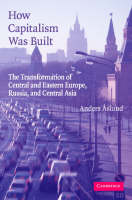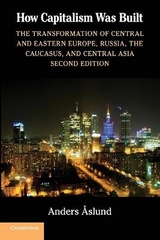
How Capitalism Was Built
Cambridge University Press (Verlag)
978-0-521-68382-1 (ISBN)
- Titel erscheint in neuer Auflage
- Artikel merken
Anders Åslund foresaw the collapse of the Soviet Union in his book Gorbachev's Struggle for Economic Reform (1989). He depicted the success of Russia's market transformation in How Russia Became a Market Economy (1995). After Russia's financial crisis of 1998, Åslund insisted that Russia had no choice but to adjust to the world market (Building Capitalism, 2001), though most observers declared the market economic experiment a failure. Why did Russia not choose Chinese gradual reforms? Why are the former Soviet countries growing much faster than the Central European economies? How did the oligarchs arise? Who is in charge now? These are just some of the questions answered in How Capitalism Was Built, covering twenty-one former communist countries from 1989 to 2006. Anybody who wants to understand the confusing dramas unfolding in the region and to obtain an early insight into the future will find this book useful and intellectually stimulating.
Anders Åslund is a leading specialist on post-communist economic transformation, especially the Russian and Ukrainian economies. In January 2006, he joined the Peterson Institute for International Economics in Washington, D.C. From 1994 until 2005, Dr Åslund worked at the Carnegie Endowment for International Peace as a senior associate and later as Director of the Russian and Eurasian Program. He is an adjunct professor at Georgetown University. He served as an economic advisor to the Russian government, 1991–94, to the Ukrainian government, 1994–97, and to President Askar Akaev of the Kyrgyz Republic, 1998–2004. Dr Åslund is the author of seven books, including Building Capitalism: The Transformation of the Former Soviet Bloc (Cambridge University Press, 2002), How Russia Became a Market Economy (1995), and Gorbachev's Struggle for Economic Reform (1989). In addition, he has edited twelve books, most recently, Revolution in Orange, and he has published widely, including in Foreign Affairs, Foreign Policy, National Interest, New York Times, Washington Post, Financial Times, and Wall Street Journal.
Introduction: a world transformed; 1. Communism and its demise; 2. Shock therapy vs. gradualism; 3. Output: slump and recovery; 4. Liberalisation: the creation of a market economy; 5. From hyper-inflation to financial stability; 6. Privatisation: the establishment of private property rights; 7. An inefficient social system; 8. Democracy vs. authoritarianism; 9. From crime toward law; 10. The role of oligarchs; 11. The role of international assistance; 12. Conclusions: a world transformed.
| Erscheint lt. Verlag | 27.8.2007 |
|---|---|
| Zusatzinfo | 7 Tables, unspecified |
| Verlagsort | Cambridge |
| Sprache | englisch |
| Maße | 150 x 230 mm |
| Gewicht | 500 g |
| Themenwelt | Geisteswissenschaften ► Geschichte ► Regional- / Ländergeschichte |
| Geschichte ► Teilgebiete der Geschichte ► Wirtschaftsgeschichte | |
| Sozialwissenschaften ► Politik / Verwaltung ► Vergleichende Politikwissenschaften | |
| Wirtschaft ► Allgemeines / Lexika | |
| Wirtschaft ► Volkswirtschaftslehre | |
| ISBN-10 | 0-521-68382-3 / 0521683823 |
| ISBN-13 | 978-0-521-68382-1 / 9780521683821 |
| Zustand | Neuware |
| Haben Sie eine Frage zum Produkt? |
aus dem Bereich



